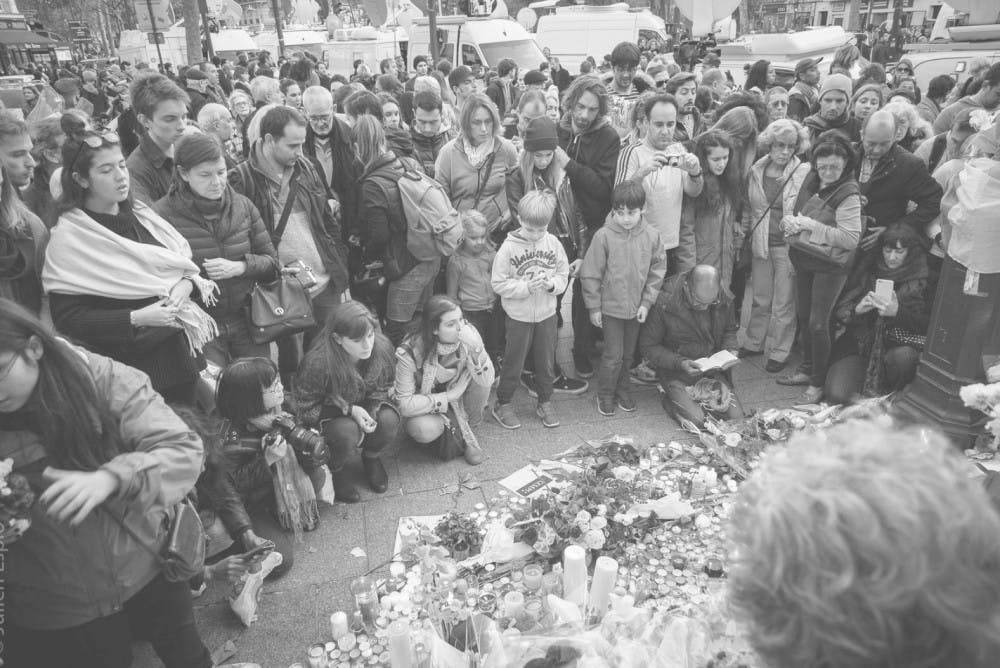By Tom Gbean | Echo]
The Western illusion of safety from large-scale terror attacks was once again shattered last Friday. In the most grisly attack in a developed nation by a terrorist organization since 9/11, more than 120 people lost their lives after eight ISIS members, equipped with assault rifles and explosive vests, targeted several densely populated locations in Paris.
France was the subject of a smaller attack earlier this year. In January, two brothers, Saïd and Chérif Kouachi, claiming to be a part of Al Qaeda, laid siege to Paris for three days.
The January attacks began with a massacre at the offices of satirical magazine Charlie Hebdo, which killed 11 people and injured 11 more. After leaving the magazine offices, the two brothers shot and killed a policewoman. They then fled and took hostages in a signage company in Damartin-en-Goele-a town in the north-central region of France. Police shot and killed the two brothers when they stormed out of the buildings, while firing on law enforcement personnel. Five other people were killed during the Charlie Hebdo attacks and 11 were wounded by related violence in France.
On Wednesday U.S. Secretary of State, John Kerry, noted in a speech at the U.S. Embassy in France, "There's something different about what happened from Charlie Hebdo, and I think everybody would feel that."
Comparing the Charlie Hebdo attack to the attacks that transpired last Friday, it is clear that ISIS's strategies for the attacks were well planned and well defined. This fact becomes transparent by the sheer number of people who were killed and the carefully selected locations.
The Stade de France, at which French President Francois Hollande was attending a soccer match between Germany and France, was among the list of targets, as well as a concert hall at which an American band was playing.
Friday's attacks do not seem to have been triggered by anything in particular. However France is geographically accessible to ISIS and is involved in the coalition bombings against ISIS in Syria.
France also has a growing population of Muslims, most of whom come into the country as refugees from the Middle East. The country is host to 3.5-5 million Muslims, which translates to 6.0-8.5 percent of its total population. The World Bank database also reports that there are currently 252,264 refugees taking asylum in France.
Although ISIS's atrocities have been mostly confined to Middle Eastern regions surrounding Syria, Iraq and surrounding regions, this attack suggests that ISIS is sending a message to not only France but to the U.S. and other nations with Western values, such as Russia.
ISIS also claimed responsibility for the Russian airliner that crashed over Egypt a few weeks ago.
A brief analysis of ISIS's statement claiming responsibility for the Paris attacks may offer a clue into why the group is beginning to stage more daring attacks in developed countries. ISIS's core belief, that Allah will bless them and deliver their enemies into their hands, propels ISIS to pursue more clearly-defined targets that will give them credibility.
ISIS begins its statement claiming responsibility for the Paris attacks by quoting from the Quran, Surah Al-Hashr 2. This particular passage talks about Allah inducing terror amongst his enemies who have built high fortresses. In the passage Allah causes his enemies to have terror in their hearts so that Allah's warriors can destroy Allah's enemy's homes successfully.
By beginning with this passage, ISIS may have been reimposing their claim that they have the capability to place insurgents behind the borders of Western nations, and thus destroy these countries from the inside through terror attacks such as those that happened in Paris.
The refugee-as-insurgent narrative may also offer a hint as to how ISIS was able to pull off the Paris attacks. As to how so many agents with explosives and assault rifles slip through security, The Atlantic suggests that there may have been a failure in intelligence gathering and analysis.
Further, almost all of the assailants were EU citizens, which gives them a cover for less security scrutiny. Because the perpetrators were EU citizens, it is plausible that the main branch of ISIS was not directly involved in the planning and execution of the attacks. Rather, ISIS may have given the group the task of carrying out the attack, leaving planning and execution to the killers. If that is the case, many more attacks may be carried out without draining the resources of the main branch of ISIS.
In addition to the likelihood that ISIS may be sending insurgents as refugees to Western nations, it is also possible that ISIS may be opting for larger scale attacks because it needs credibility in the eyes of its supporters.
Closing the statement, ISIS warns France and other nations that more attacks will follow if the bombing campaigns in Syria continue: "Let France and all nations following its path know that they will continue to be at the top of the target list for the Islamic State and that the scent of death will not leave their nostrils as long as they partake in the crusader campaign."
ISIS has released a new video suggesting that it has plans to attack Times Square in New York City. Mayor Bill De Blasio offers words of consolidation not only for the people of Paris but for the world.
"We understand it is the goal of terrorists to intimidate and disrupt our democratic society. We will not submit to their wishes," reported Fox2now.





